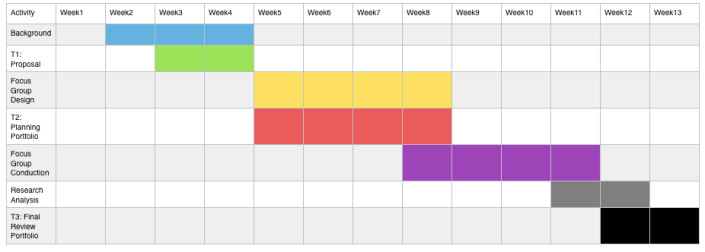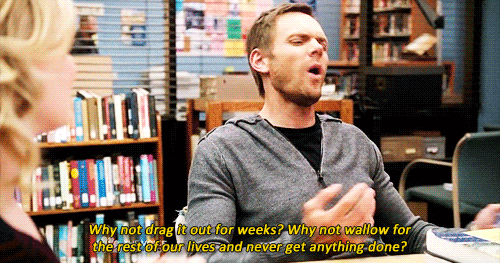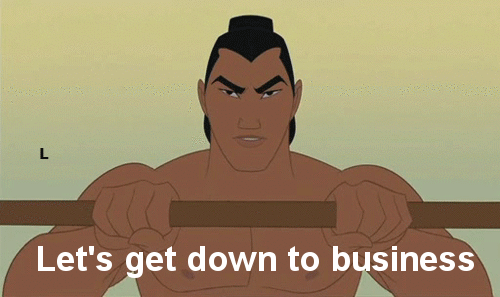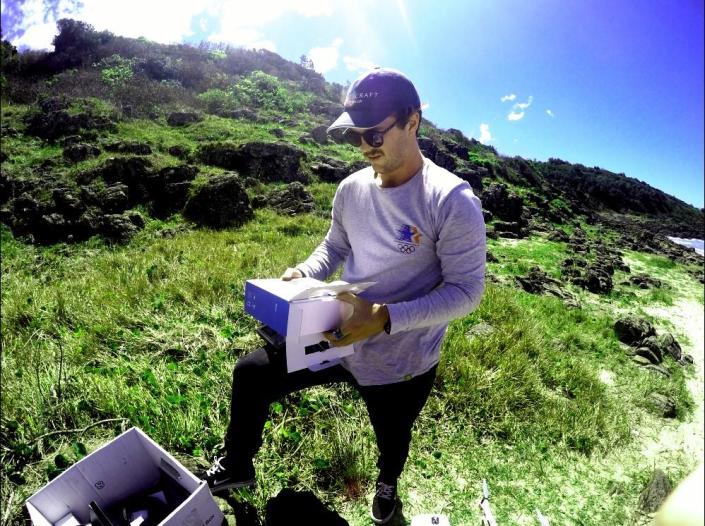BCM212
Reflective Portfolio: University Motivations
I’d like to begin with an expression of thanks to those in my BCM 212 class at the University of Wollongong for participating in the focus group I undertook. The response from classmates made this project possible and the results that made it into this report have allowed a space to be uncovered in the theorist sphere to understand the mindset of a student in Communications and Media. I’d also like to thank UOW tutor Renee Middlemost, who took notes whilst the focus group was being conducted by me up the front, this was a above and beyond effort and allowed me to have two samples of useful notes with my recorded device to make full use of the methodology. Renee and Kate Bowles time and support to all students within the tutorial and lecture, and ability to provide clarification and work to enhance my capabilities as a researcher have definitely affected the way I experience the world through a researcher’s lens.
This research project aimed to understand the intricacies of student motivation both intrinsically and extrinsically towards both starting and completing a project at university level. As a university student, my interest and corresponding curiosity into the way technology can submerge itself throughout cross-disciplinary practises and be applied to real world services that aim to improve or help a progressive society. With that, I wanted to know how those in similar university situations to me approach these tasks than can sometimes seem ambiguous or containing too much freedom. I believe that essays and projects or “digital artefacts” have a very important place in academic research, however, when one is used to compensate the others failure for the marks at the end of a subject, thats when I believe as a collective could be detrimental to the time and effort of others in the same medium.
Reflection:
Perhaps one of the main criteria in this overall assessment is my curiosity into the act of doing. The processes, skills and inevitably the failures that come with starting a digital project for a portfolio. Some further reading I’ve linked to my project introduction and something I want to reiterate based on the engagement and feedback from my tutor, is my passion for motivating students both new and existing, to undertake physical idea development. This is showcased through my guest speaking at a subject within communications and media, Convergent Media Practises (BCM112), whereby I love to hear the ideas from various people, and then encourage them to get in and start doing it. My curiosity almost took control of the focus group, as the questions I had prepared were quickly taken over by unscripted conversation and general improvised open questions. This is where the true interest was uncovered and indeed made the final product. In terms of considerations with regard to curiosity, it quickly lead me to start thinking about socially responsible research design. Thinking to myself, if i’m indeed creating a space that can be used by not only the students in moving forward and future assignments, but also teachers who can think about some of the points i’ve made in my research, but also outside bodies that can compare the results from my studies, to trends and workplace attitudes, my research has to be appropriately taken into account at the start of the project. I believe careful planning of time, question preparation, consistent talks with my tutor and the ability to adapt and accept any result and be reflective of this assisted me.
Critical judgment was almost something that came prominent within the secondary research component. The lack of specific information about what i learnt was a really niche question meant that I had to not only quickly adapt, but embrace the trajectory of where the research could go if given extended research time. I think the idea of my curiousity mentioned above meant that I had to be careful in what research I was presenting. A lot of the sources I was finding were interesting research but kind of alluded me to the fact that this space i’m working in is actually uncovered research, and what was interesting in fact in the project, was the trajectory to questions I was asking post-project. The idea of questioning education systems, a changing world dynamic, perhaps the relationship between graduating students exceeding or being ahead of society. These central ideas I believe is what is touched on with Mike Caulfield in his Digital Polarization Initiative,”One of our big focuses for the Digital Polarization Project has been to try to engage the curiosity of students — to get them to think like reporters rather than attorneys, as encyclopedists rather than activists. Turn off the rhetoric for a while and just delight in finding new things out.” (M Caulfield, 2017). This however, rather being applied to the research topic or question, was more onto me as a communications researching professional. Allowing me to accept that perhaps my research question initially doesn’t have an answer, but where the value sits is within the conversation and voices to do with the topic, such as those from my focus group, and gaining that contentment driven by my own curiosity.
The next aspect of this critical judgement was indeed the collection of data being transferred into useful data that I would then present into the findings. Focus groups only criticism from me was that everyone could chose to not share the information I required, fortunately the group I had gave some useful insight, however, as a professional showcase of research, I then had to decide which information stimulated the question I initially set out for, then, that was going to be valuable for the stakeholders i’m targeting and creating that dialogue between them.
I think in consideration of what could be improved or what went ‘wrong’ isn’t the correct terminology. The space is now left open for building or further development. A survey was considered in the context of the project, but the idea was more to create a new field of thinking, something that cracks open a new and interesting thinking methodology, and the research values showcased in the lectures were pivotal and referenced heavily. Perhaps this obligation to a wider audience is the main focus out of the research i’ve started. A focus group was a great addition to this kind of research, guided that I continued the upheld values of being a respectful and communicator and those involved were reassured their anonymity. I was in an interesting position, the idea that I was completing a project as a student, about other student project motivations, meant that I had a responsibility to not only represent the student body toward a higher stakeholder, but I also had to be aware that this had the potential to produce very limited content, that ultimately affected my results as a student. This was quickly overpowered however, by the above mentioned curiosity and passion for helping get creative ideas out in the open to showcase skillsets of others.
Task 2: Project Design and Management
Earlier this semester, I detailed the beginning of a research project I wanted to undertake within the University to uncover the truths, myths and trends of student motivation toward starting and more importantly maintaining a project that would not only benefit the degree, but be a tool for creating and adding to the new age portfolio of digital literacy and competence when going to seek employment or start a professional career in a practise. My project proposal had a lot of ambitious research methodologies and aimed to gather as much information from students at the university as well as a survey and a background research into the generational trends that dictate student motivations

The feedback from the initial planning was succinct into a working model and a realistic plan. I’m conducting a focus group discussion with the tutorial class on Thursday week9 at 2:30pm class. This will allow me to ask the following questions to a sample of students that are required by the degree to complete projects or equivalent related to my project plan. The questions are as follows:
Focus Group Questions
- What motivations drive your projects at university across any subject?
- Do you complete projects or think about projects in the way that you could incorporate it into a professional portfolio or something you’re keen to pursue after university?
- Do your projects require extra motivations because they’re being marked at university, or does the feedback assist the final product?
- Do the topics or inspirations for a project resonate an interest?
- What barriers or “put offs” you believe stop you (and other students) from starting a project and making it publically available
- What projects have you done in the past that are digitally available for a portfolio?
- Are these projects possible career options, or could they be moulded into a career niche?
I’ve identified the timeline I want to stick to, and leading into week 8 (this week) I’ve narrowed down the questions I want to ask as well as the research I want to look into and see if I can crack the code university students and teachers have been trying to channel since I’ve began my learning career.
Follow my Journey;
Why DO a Project ? // Research Proposal
Are projects undertaken by students at university intrinsically or extrinsically motivated?

Whether or not students undertake a research project based on intrinsic or extrinsic motivations are irrelevant, at the end of the day we all are required to do one in some form or another and this semester I aim to conduct the “inception” research methodology of a project about projects.
Throughout my university endeavours my classes have all required a major project or digital artefact in some format whether it be a physical submission of a device or a platform that is openly active on the internet. These were all based, for me personally, on a curiosity trajectory that I wasn’t sure i’d finish, nor did I know if it were going to be anything like the intention at the beginning. This is how I’ve come to be in the position I am, and is why I’m such a believer in the skill set characteristics getting involved and making things early and documenting everything can produce. Is everyone else doing these projects set out to work towards a practice field or area of expertise? Or are there those that create content for the mark to pass a class for a degree?
I’d love to hold information sessions about the class initially, ask them what their projects are and then to understand the process that goes into the making of and thinking behind a creative work. Does their curiosity spark their works and/or are they looking at developing a skill set in media and communications ie. photography skills or editing in particular software. In terms of data collection, I think perhaps a focus group of a seminar group would be effective my my progress. I would adjust the sample number according to variation in answers and perhaps think about creating a survey based on the results in the form of if intrinsic/extrinsic in nature in response to projects what these are, and direction taken after completion. I’d also like to gather my own research into trends on generational differences in graduates, and perhaps looking at a shift in values from university, whether the full focus is on the career at the end or the present experiences created by what interests us.
Compare these results with projects completed in the past, which could serve an interesting tool for students to engage with my final project to reflect on their university careers so far and the direction they’re headed, whether it be theoretical or practical in nature. This kind of project links directly with a guest lecture appearance I made encouraging students to not think about marks and essays as the “easy option” or “cop out” when a project gets overwhelming or looks like failing.

Curiosity = Content

Perhaps a word to describe the origins of my university trajectory would in-fact be week one’s topic of ‘Curiosity’. I’ve always been fascinated with topics or activities that I have little to no experience in. This included this degree, it also included where I wanted to take this course and mould myself into the practitioner I am today.
I’m Sam and I’m 3rd and final year of my Communications and Media (digital media) degree. I want to take you on a journey that has been my BCM career to date, and how I plan to take the same mentality that’s brought so many interesting iterations along the way.
In 2015 I walked into a class that required me to create a project with a digital creative medium to convey a message. Initially it was challenge because I hadn’t used the allocated platforms, however I knew I wanted to create a video series and I wanted to do it with something I had no idea about and perhaps inform others that our curiosity could be this message I spent countless hours wondering what was. So I created a 3D printed prosthesis for a young child who had lost their left limb from the forearm down. This was successful and upon my curious endeavours was able to apply our creative communication practise to health sciences and engineering faculties, done through the powerful aid of YouTube and content aggregation.
This didn’t push me as much as the curiosity bug did, and so by the next semester I was curious about an entire device, the Drone (or quadcopter, or UAV). This is where I am today. I was first of all curious how I could build a project with something I was backgrounded in with a technology I once thought was a breed of cattle. So, inevitably, it was taken to the farm I worked on before moving to university and created a short series on Drones Agricultural Uses. This was with the cheapest off the shelf drone and the free software pre-installed on my laptop at the time. The aesthetic didn’t interest me, the curious nature of pumping out what another use for this technology did, and these particular videos helped me reach some sort of message, and with perhaps better resources the crisp quality could have met those who needed it.
Today, I’ve come along way in teaching myself through thorough research of Wiki-hole like trial and error. I’ve successfully built my own drone, by first wondering how it all works and buying a cheap off the shelf one and taking it all apart screw by screw. I was curious to how I could apply my fascination with their usage outside commercially safe aerial photography and videography, which has lead me to customising my own to do what I need it to do.
Curiosity has lead me into trying to change the way these devices are thought about at surveillance and military tools into how they’re application to make certain jobs safer or increase an aesthetic to a film or movie video piece. This is my exploration with the device i’ve created and want to continue to give the opportunity of showcasing and receiving feedback. My device being 360 degree video enabled highlights the curious nature of the user, and gives them freedom to all but fly the device to see what they desire. This will hopefully make sense in the projects I conduct in the future, whereby YouTube video content doesn’t restrict its user to view what I intended.